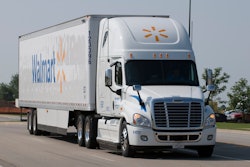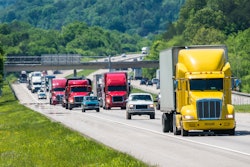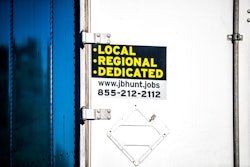
Private carriers continue to enjoy the benefits of having more loyal drivers than their for-hire counterparts, which is resulting in welcomed payoffs like reduced accidents and more devotion to equipment care and customer relations.
National Private Truck Council President and CEO Gary Petty talked to Commercial Carrier Journal about the benefits of driver loyalty among private fleets as NPTC gears up for its Annual Education Management Conference and Exhibition this May in Orlando.
“We think we're going to have the biggest attendance ever,” Petty said of the event which include electric trucks and the latest fleet technologies. “Private fleets are growing and they’re very keen on deploying new state-of-the-art equipment and they're looking for best solutions.
[Related: More pay? More home time? CCJ survey looks at what drivers want]
While the latest, greatest equipment can improve efficiency on its own merits, the North American Council for Freight Efficiency revealed that the driver can often make the bigger difference than the technology itself.
NACFE’s Tire Pressure System Confidence Report shows that automated tire inflation system adoption is lower among private fleets because their drivers are more likely to get involved and do their part to ensure that tires are inflated at the proper pressure.
NACFE Executive Director Mike Roeth said the study showed that drivers with for-hire carriers “are a little less loyal…and for instance, they wouldn't check their tire pressures whereas drivers with private carriers would check their tire pressures, or if there was a problem, they would report it more.”
 According to the Federal Motor Carrier Safety Administration, private carriers were involved in far fewer crashes than for-hire fleets from 2017-2021.Federal Motor Carrier Safety Administration
According to the Federal Motor Carrier Safety Administration, private carriers were involved in far fewer crashes than for-hire fleets from 2017-2021.Federal Motor Carrier Safety Administration
“For-hire truck drivers are less experienced and move from one company to another five times more frequently than drivers employed by private fleets,” the report states. “Those buying and operating these fleets therefore seem to lean toward the less driver-intensive systems of automatic tire inflation. Private carriers’ drivers are more tenured and those fleets seem to be choosing tire pressure monitoring systems more frequently, as they are generally less expensive to procure and deliver more information via data collection and telematics to the fleet management for action and analysis.”
[Related: Walmart's recruitment strategy could pay off for other fleets]
Petty pointed out that in addition to improved truck maintenance, drivers in private fleets are safer behind the wheel.
“Private fleets overall are three times safer than the rest of the trucking industry and that's based on FMCSA data scores reportable accidents per million miles,” he said.
When searching for drivers, private fleets tend to look for candidates with solid interpersonal skills which can translate to better customer service.
“About a third or more of the time that a private fleet driver is on duty is involved in non-driving functions that like unloading product at the store, dealing with the store manager and staff and so forth,” Petty said. “So there are relationship skills that go beyond the obvious needed skills as a driver.”
The differences in tenure between private and for-hire drivers are stark. The average private fleet driver stays at the same company for more than 10 years, Petty said, making the average turnover rate about 14.5% since 2014.
“That compares with 90% or more turnover in the for-hire, over-the-road side of the industry,” Petty added.
Private drivers tend to enjoy greater pay and benefits and more home time which helps to attract more candidates. Oftentimes the biggest recruiters for private fleets are the drivers themselves, Petty said. Drivers can earn bonuses if new hires they bring on board stay with the company beyond a year.
“A really good driver team collectively has a strong incentive to ensure that that future team members that are brought on board are like kind and have the same kind of commitment to safety and pride and have the values that make for a safe and effective fleet,” Petty said.











